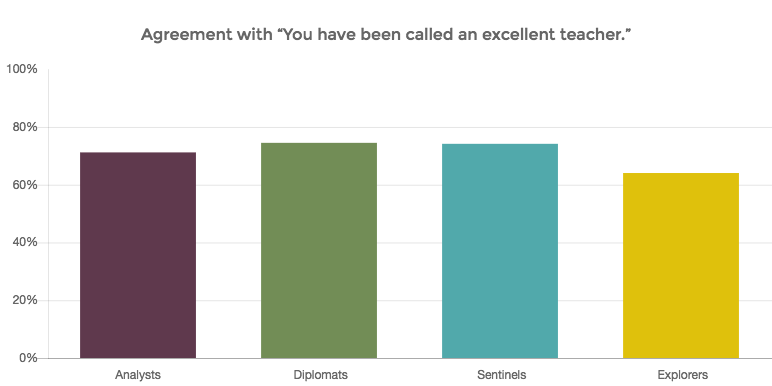Think about your favorite teacher. What made them special?
Was it their ability to change your perspective on a topic? Their sense of humor? Their ability to motivate you?
As you’ll probably know from experience, every teacher approaches the job differently. There are teachers who run their classrooms like a tight ship. Meanwhile, others prefer a more unstructured approach where students can explore their creativity.
There are definitely pros and cons to each.
What are your strengths as a teacher? More importantly, which famous teacher are you most like?
You can also click on any template to customize it using our online persona guide tool. No design know-how required.
The 6 teacher personality types
Think about a teacher you know from TV or the movies. Are they inspiring? Spontaneous and unconventional? Strict and scary?
Teachers can make an long-lasting impression on us for a variety of reasons.
After reading up on the common personality traits of teachers, combing through lists of famous teachers in pop culture, and drawing on my own personal experience as a teaching assistant, I created the teacher personality spectrum:
As you can see, certain personality types are extremes of one personality trait, while others fall more in the middle. I suppose a teacher who intersected in the centre of the spectrum would be some kind of super teacher.
Now, of course you can’t really boil a whole group of people down into six categories (you shouldn’t be boiling people at all, by the way…).
But like characters on TV, these personality types are exaggerations of real life. You may fall somewhere in between two teacher personality types on the spectrum.
So take these personality descriptions with a grain of salt!
The Sergeant Teacher
If your personality fall on the authoritarian side of the spectrum, you may be a Sergeant Teacher.
You may be thinking of the stereotypical gym teacher making their students do drills.
But Sergeant teachers aren’t all tyrants. They may simply want to instil in their students a value system of discipline, structure, and hard work.
These teachers want to see their students reach their full potential. They know that in order for that to happen, their students need to put in the work.
Taking on a stricter authoritarian role can make it difficult to form bonds with students. Teachers with this personality type may need to exercise patience and empathy if they want their students to be able to really view them as a mentor.
For students who are willing to step up to the challenge, Sergeant teachers can be an important driving force in their education and development.
A tool to help Sergeant teachers plan out their process
For Sergeant teachers, I recommend creating a process chart to help students stay on track.
The Parental Teacher
This teacher personality type has a strong nurturing instinct. They genuinely want their students to succeed and are willing to invest a lot of time and energy into helping them.
Parental teachers fall between passion and personability on the personality spectrum. They are passionate about teaching and are able to form trusting bonds with their students.
This type of teacher may find the school system to be restrictive, and may be tempted to bend some of the rules when they feel it will benefit their students.
Because they’re so sympathetic, it can be easy for students to take advantage of them–that’s where this teacher personality type will need to exercise their authority, even if they would rather not.
It’s also easy for this teacher personality type to get burnt out. They may need to learn to draw some emotional boundaries in order to keep doing their job well.
When a Parental teacher learns to employ a productive level of discipline, they will really reach their potential as an educator.
A tool to help Parental teachers celebrate their students
Because Parental students like to dote on their students and celebrate their achievements, having a stack of congratulatory cards on hand may be just what they need. Even better if they’re cute customized designs!
The Aloof Teacher
Don’t confuse their stoic demeanour with indifference–Aloof teacher personality types love their jobs. They just don’t want to coddle their students.
Aloof teachers manage to strike a balance between patience and discipline. Because of this, they are able to easily gain their students’ respect.
They value a structured classroom and generally work well within the school system. A practical personality type, these teachers may take the initiative to try and reform aspects of the system that they feel are not functioning as well as they should be.
This teacher personality type will make themselves available when students needs a little extra help. But they also aren’t afraid to give their students a reality check.
Beneath their sarcasm and raised eyebrows is a soft and squishy soul who wants the best for their students. The students who know them well will know that these teachers have a silly side–you just have to coax it out of them.
A tool to help Aloof teachers show they care
Congratulations will mean a lot when they come from a stoic teacher. Every now and then, Aloof teachers may want to take the extra step to praise students who have done particularly well. Giving students a certificate can be a nice gesture.
Use our online drag and drop certificate maker tool to customize this template easily.
The Reluctant Teacher
OK, so teaching wasn’t everyone’s first choice for their career. Sad but true.
There are also plenty of teachers out there who have lost their passion along the way. Maybe one too many students refused to listen to them. Maybe they’ve become jaded by the education system.
That doesn’t mean that they don’t have enthusiasm deep inside them, waiting to come out when their students show real interest in what they’re being taught. In fact, despite their withdrawn attitude, Reluctant teachers can still be very good teachers. They just choose to only put in the effort they get back from their students.
Reluctant teachers are practical and straightforward. They’re not looking to waste their time, or their students’ time.
It may be difficult for this teacher personality type to go the extra mile to engage their students with the learning material, but the payoff can be worth it.
A tool to help Reluctant teachers inspire their students
Sometimes, what Reluctant teachers need is to get students’ creativity flowing. When students are more engaged, maybe they will feel more engaged as well!
Getting students to brainstorm ideas with a mind map could help them think outside the box. Teachers can even try creating one of their own.
The Wizard Teacher
Some people seem like they were born to be teachers. They’re real wizards at their jobs. See where I’m going with this?
Teachers with this personality type are enthusiastic about education, passionate about their material, and spontaneous in their teaching methods. They often prefer hands-on participation and encourage students to ask questions.
This teacher personality type knows how to command the attention of a room. But their curiosity can also fuel an anarchist streak in them. These teachers may not have any problems bending the rules from time to time if they think it will be educational for their students.
Their contagious enthusiasm can make their classrooms very engaging environments for students. That being said, this teacher personality type can also be slightly narcissistic in their enthusiasm, following their own whims and forgetting to attend to the needs of certain students.
A tool to help Wizard teachers stay on track
To help Wizard teachers from going too off-track, a checklist can help them remember all of the points they need to cover in a lesson.
The Buddy Teacher
Buddy teachers see themselves as just that–friends to their students. This teacher personality type is the extreme on the “personability” side of the spectrum.
Students tend to love this type of teacher because they can relate to them. While some teachers enforce a power structure in their classroom, Buddy teachers are right there cracking jokes with their students.
Because they tend to have a good relationship with their students, students may find it easy to confide in Buddy teachers. Buddy teachers may also be inclined to take the side of their students in discussions about the school system.
The obvious problem this teacher personality type poses is a potential lack of discipline in their classrooms. This teacher personality type may be reluctant to exercise authority for fear of weakening their rapport with students. They may find it difficult to step into an authority role, and their students’ focus can suffer because of it.
Buddy teachers can also be prone to favoritism, since they care deeply about their rapport with their students.
Still, when they find the right balance between structure and personability, this teacher personality type can be a great source of support and mentorship for students.
Tools for Buddy teachers
Sometimes, Buddy teachers may need to remind themselves that even though their students love them, they still need to show their authority every now and then. Maybe a sneaky hierarchical chart in their notebook will help them step up and take control every now and then.
What type of person makes the best teacher?
Studies have been done to figure out what personality type is best suited for people in the teaching profession. Many of these studies categorize teachers in several personality types.
For example, a study published in 1961 by J. Andelson categorized teachers into three personality types: those who prefer their profession, those who prefer their students, and those who prefer their institution.
Andelson noted pros and cons of each teacher personality. Those who value their profession have an “outstanding professional knowledge” and are able to enthusiastically teach their students in a “charismatic” but “narcissistic” way.
Then, those who prefer their students encourage their pupils to develop their potential, with “altruism” and “dedication to teaching”. But it’s also easy for this personality type to get burnt out.
Meanwhile, those who prefer their institution enthusiastically teach a particular value system to their students, but this can “diminish spontaneity in students” and limit their independent judgement.
Another study published in 1960 by D. G. Ryans made the distinction between different teacher personalities as well. The study classified certain teachers as being a “friendly type” who are “full of understanding and warmth”, while other teachers are more inclined to being “distant and cold”.
The study also distinguishes between teachers who show “responsible and systemic behavior” and those who behave “chaotically and recklessly”.
16Personalities conducted their own study asking their community to agree or disagree with the statement, “You have been called an excellent teacher.”
They found that the people who agreed with the statement the most exhibited “feeling” and “judging” traits–people who are able to connect with students and who respect structure and discipline.
So while we can’t conclusively say that one type of person makes for the best teachers, there does seem to be a need for a balance between authority and personability.
But there is no one right way to approach teaching. Different students have different needs. Different classes require different approaches. There are also cultural differences to take into consideration.
If you’re a teacher, maybe you think your approach is the best! Where do you fall on the teacher personality spectrum?
Check out our other personality guides:
What Disney Villains Can Tell Us About Color Psychology
The Hogwarts Guide to Company Culture
The infographic in this article was created by Michelle Lee.

















































